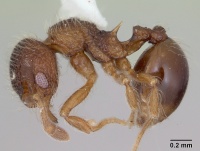Lachnomyrmex mackayi
| Lachnomyrmex mackayi | |
|---|---|

| |
| Scientific classification | |
| Kingdom: | Animalia |
| Phylum: | Arthropoda |
| Class: | Insecta |
| Order: | Hymenoptera |
| Family: | Formicidae |
| Subfamily: | Myrmicinae |
| Tribe: | Attini |
| Genus: | Lachnomyrmex |
| Species: | L. mackayi |
| Binomial name | |
| Lachnomyrmex mackayi Feitosa & Brandão, 2008 | |
The only two collections of this species were extracted from the leaf litter of wet montane forests of Panama.
Identification
Feitosa and Brandão (2008) - Body covered by continuous vermiculate rugae; in lateral view, petiolar node considerably elevated and subtriangular; dorsum of postpetiole with more than 10 long hairs; subpostpetiolar process moderately developed; first tergite of gaster with of long flexuous hairs restricted to the anterior third. The absence of a median prominence on the dorsum of postpetiole and the presence of long flexuous hairs on the first tergite of gaster separate this species from the related Lachnomyrmex haskinsi and Lachnomyrmex regularis. In addition, the cited species bear less than 10 long hairs on the postpetiole dorsum. Lachnomyrmex mackayi is also similar to Lachnomyrmex fernandezi; however, the latter has the petiolar node rounded dorsally and the long flexuous hairs covering the entire surface of the first gastral tergite.
Keys including this Species
Distribution
Latitudinal Distribution Pattern
Latitudinal Range: 8.48° to 8.433°.
| North Temperate |
North Subtropical |
Tropical | South Subtropical |
South Temperate |
- Source: AntMaps
Distribution based on Regional Taxon Lists
Neotropical Region: Panama (type locality).
Distribution based on AntMaps
Distribution based on AntWeb specimens
Check data from AntWeb
Countries Occupied
| Number of countries occupied by this species based on AntWiki Regional Taxon Lists. In general, fewer countries occupied indicates a narrower range, while more countries indicates a more widespread species. |

|
Estimated Abundance
| Relative abundance based on number of AntMaps records per species (this species within the purple bar). Fewer records (to the left) indicates a less abundant/encountered species while more records (to the right) indicates more abundant/encountered species. |

|
Biology
|
Castes
Known only from the worker caste.
Nomenclature
The following information is derived from Barry Bolton's Online Catalogue of the Ants of the World.
- mackayi. Lachnomyrmex mackayi Feitosa & Brandão, 2008: 27, figs. 10, 19 (w.) PANAMA.
Unless otherwise noted the text for the remainder of this section is reported from the publication that includes the original description.
Description
Worker
Holotype HL 0.68; HW 0.65; ML 0.22; SL 0.44; EL 0.17; WL 0.79; PSL 0.18; PL 0.31; PPL 0.17; GL 0.88; TL 3.06; CI 95; SI 68; OI 26. Worker (n=1). HL 0.61; HW 0.60; ML 0.20; SL 0.39; EL 0.14; WL 0.72; PSL 0.16; PL 0.27; PPL 0.14; GL 0.74; TL 2.69; CI 97; SI 66; OI 24.
Color light reddish-brown, with yellowish appendages. Head and mesosoma finely covered by continuous, vermiculate rugae, transverse on anterior portion of pronotum, grading to longitudinal on rest of promesonotum, mesopleura and lateral surfaces of propodeum; mandibles with few and short longitudinal striae restricted to basal portion; petiole and postpetiole irregularly rugose. Abundant pilosity on head and dorsum of promesonotum; petiolar node with about six long hairs; dorsum of postpetiole with more than 10 long hairs; first tergite of gaster with long flexuous hairs restricted to the most anterior portion, near the insertion of postpetiole.
Head slightly longer than broad, with vertexal margin only moderately convex; frontal lobes weakly rounded laterally; eyes comparatively large, with approximately eight facets at greatest diameter. Promesonotum gently convex in profile; metanotal groove relatively narrow and deeply impressed; propodeal spines mostly straight, with apexes minimally directed upwards; teeth of propodeal lobes swollen basally, with about half-length of propodeal spines. Petiolar node elevated and subtriangular in dorsal view; dorsum of postpetiole strongly convex and with a discrete anteroventral projection, directed anteriorly.
Type Material
Holotype worker. PANAMA: Chiriqui: Bocas del Toro, Cont. Div., 9.vi.1995, R. Anderson col., no. 17840, specimen code CASENT0173883 [MCZC]. Paratypes. PANAMA: Chiriqui: 20.4km N. San Félix, 8.vi.1995, R. Anderson col., no. 17767 (1 worker) [WPMC].
Etymology
This species is named after Dr. William “Bill” Mackay, myrmecologist at the University of Texas, El Paso. Mackay sent us important material for this study, including the type series of this species.
References
- Feitosa, R.M. & Brandão, C.R.F. 2008. A taxonomic revision of the Neotropical myrmicine ant genus Lachnomyrmex Wheeler (Hymenoptera: Formicidae). Zootaxa 1890, 1-49.

